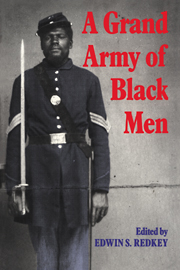Book contents
- Frontmatter
- Contents
- Preface
- Acknowledgments
- List of Abbreviations
- Introduction: For Freedom and Equality
- 1 Black Soldiers in White Regiments
- 2 South Carolina, Georgia, and Florida
- 3 Virginia and North Carolina
- 4 The Gulf States
- 5 Occupation Duty
- 6 For the Rights of Citizens
- 7 The Struggle for Equal Pay
- 8 Racism in the Army
- 9 The Navy
- 10 War's End
- Index
- Cambridge Cultural Social Studies
- Frontmatter
- Contents
- Preface
- Acknowledgments
- List of Abbreviations
- Introduction: For Freedom and Equality
- 1 Black Soldiers in White Regiments
- 2 South Carolina, Georgia, and Florida
- 3 Virginia and North Carolina
- 4 The Gulf States
- 5 Occupation Duty
- 6 For the Rights of Citizens
- 7 The Struggle for Equal Pay
- 8 Racism in the Army
- 9 The Navy
- 10 War's End
- Index
- Cambridge Cultural Social Studies
Summary
ON JANUARY 30, 1865, Chaplain Henry M. Turner crossed the Cape Fear River from Fort Fisher to Smithville, North Carolina. His regiment, the 1st U.S. Colored Infantry, occupied Smithville after Confederate troops fled; they were the first black soldiers the local people had ever seen, and Turner was certainly the first black officer.
Turner's primary job was to recruit freed slaves for the Union Army. He made speeches, cared for the sick, and visited the homes of all he could reach. “Recruiting in this department goes on finely, ” he wrote. “We have enlisted several hale, stalwart-looking fellows, whom we think will fill their places nicely. One man wants his gun now, so he can get to killing right off.”
Slaves from adjacent counties fled to Smithville, and Turner observed them closely. “They are coming in by droves, sometimes fifteen or twenty in a gang, some of whom are pitiful-looking creatures. Oh, ” he wrote, “how the foul curse of slavery has blighted the natural greatness of my race!” As a Methodist minister, Turner did not like the morality of the slaves; they had been encouraged to breed and produce new slaves for their owners. But he found them eager not only to join the army but also to enter school, start new churches, and work as free people. There was much to be done among them, and he urged his Northern readers to come to the South to serve the freedmen.
Southern whites also attracted Turner's attention. “White people, ” he wrote, “nearly without exception, showed a bitter and chagrined countenance” in Smithville.
- Type
- Chapter
- Information
- A Grand Army of Black MenLetters from African-American Soldiers in the Union Army 1861–1865, pp. 159 - 204Publisher: Cambridge University PressPrint publication year: 1992



